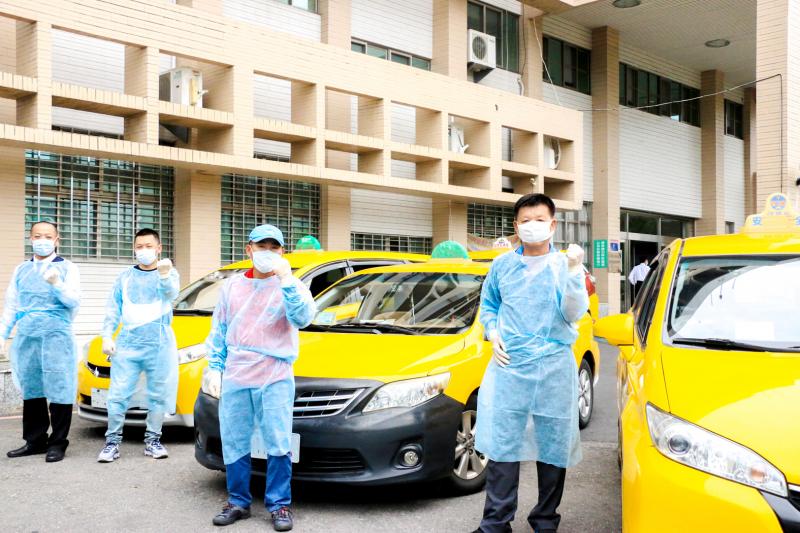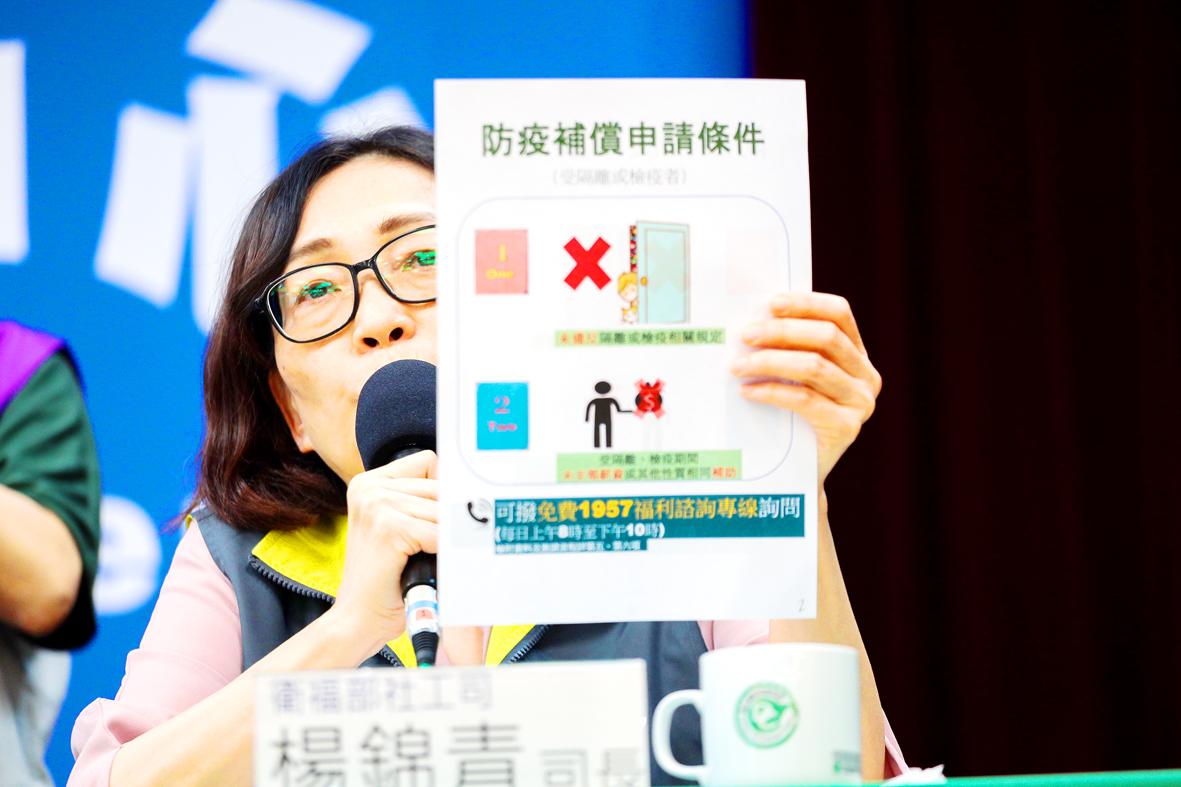The Central Epidemic Command Center (CECC) yesterday announced 20 new imported cases of COVID-19 and one local case, bringing the total in Taiwan to 216, with one of the new cases being an American who was transiting in Taiwan, but felt ill at the airport and was hospitalized.
Minister of Health and Welfare Chen Shih-chung (陳時中), who is also head of the center, said the new cases were eight people tested at airports upon their return to the nation, nine people who were undergoing quarantine at home, one person who was under home isolation, and two people who tested positive after seeking medical treatment.
The most recent case is a French national who is studying at National Tsing Hua University, the CECC said in an update at 7:20pm yesterday.

Photo courtesy of the Pingtung County Government via CNA
Most of the cases were detected by the center’s airport screening and home quarantine monitoring mechanisms, while the two people who sought treatment were a married couple who had returned from the US on Wednesday last week before the center implemented a home quarantine order on all travelers entering Taiwan the next day, Chen said.
“One of the imported cases is a five-year-old girl, who traveled with her mother on a company visit to Turkey. She was detected with a fever at the airport upon their return,” he said.
Another imported case was the American who was making a transit in Taiwan on Friday last week. He felt unwell during his flight to Taiwan and officials determined that he was not in a fit condition to take the connecting flight, Chen said.

Photo courtesy of the Central Epidemic Command Center
“As he could have been an infection risk to passengers on the flight, we asked him to stay and he was admitted to a negative pressure isolation ward,” Chen said. “The test results came back positive, so he has remained in hospital for treatment.”
The imported cases had visited Belgium, Bulgaria, France, Germany, Indonesia, Ireland, Italy, Spain, Thailand, Turkey, the UK and the US, returning to Taiwan between March 9 and Monday, the center said.
After Chinese authorities announced that they are lifting the lockdown in Hubei Province and its capital, Wuhan, where COVID-19 originated, on April 8, Chen said the center would discuss with the Mainland Affairs Council whether the special notation on Taiwanese who had visited Hubei Province in immigration services data should be removed.
He said the notation was not a punishment, but so that the government could be especially cautious, as there had been a greater risk of them bringing the virus to Taiwan.
When the lockdown is lifted, Taiwanese in Hubei Province would be treated the same — a mandatory 14-day home quarantine — as Taiwanese returning from other nations, he added.
After applications for home isolation and quarantine compensation of NT$1,000 (US$32.99) per day began on Monday, Chen urged those eligible not to rush to apply for it now, as the application period lasts two years.
“The number of people under home quarantine has significantly increased, so local governments are really busy,” he said. “We hope those eligible can show some understanding for busy government officials and apply for the compensation at a later date.”
Ministry of Health and Welfare Department of Social Assistance and Social Work Director-General Yang Chin-ching (楊錦青) said that people who are eligible for the compensation are those who have been placed in mandatory home isolation or quarantine, those in quarantine centers, and the caregivers of those under home isolation or quarantine who cannot take care of themselves.
They can only apply for compensation if they have not breached their quarantine order and have not received a salary or other compensation during the quarantine period, she said, adding that they can apply in person, by mail or online.
“We are encouraging people to apply online,” she said, adding that more than 80,000 people had been placed under home isolation or quarantine as of noon yesterday and 3,032 had already submitted an application.

TRAGEDY STRIKES TAIPEI: The suspect died after falling off a building after he threw smoke grenades into Taipei Main Station and went on a killing spree in Zhongshan A 27-year-old suspect allegedly threw smoke grenades in Taipei Main Station and then proceeded to Zhongshan MRT Station in a random killing spree that resulted in the death of the suspect and two other civilians, and seven injured, including one in critical condition, as of press time last night. The suspect, identified as a man surnamed Chang Wen (張文), allegedly began the attack at Taipei Main Station, the Taipei Fire Department said, adding that it received a report at 5:24pm that smoke grenades had been thrown in the station. One man in his 50s was rushed to hospital after a cardiac arrest

PUBLIC SAFETY: The premier said that security would be tightened in transport hubs, while President Lai commended the public for their bravery The government is to deploy more police, including rapid response units, in crowded public areas to ensure a swift response to any threats, President William Lai (賴清德) said yesterday after a knife attack killed three people and injured 11 in Taipei the previous day. Lai made the remarks following a briefing by the National Police Agency on the progress of the investigation, saying that the attack underscored the importance of cooperation in public security between the central and local governments. The attack unfolded in the early evening on Friday around Taipei Main Station’s M7 exit and later near the Taipei MRT’s Zhongshan

SAFETY FIRST: Double the number of police were deployed at the Taipei Marathon, while other cities released plans to bolster public event safety Authorities across Taiwan have stepped up security measures ahead of Christmas and New Year events, following a knife and smoke bomb attack in Taipei on Friday that left four people dead and 11 injured. In a bid to prevent potential copycat incidents, police deployments have been expanded for large gatherings, transport hubs, and other crowded public spaces, according to official statements from police and city authorities. Taipei Mayor Chiang Wan-an (蔣萬安) said the city has “comprehensively raised security readiness” in crowded areas, increased police deployments with armed officers, and intensified patrols during weekends and nighttime hours. For large-scale events, security checkpoints and explosives

ON ALERT: Taiwan’s partners would issue warnings if China attempted to use Interpol to target Taiwanese, and the global body has mechanisms to prevent it, an official said China has stationed two to four people specializing in Taiwan affairs at its embassies in several democratic countries to monitor and harass Taiwanese, actions that the host nations would not tolerate, National Security Bureau (NSB) Director-General Tsai Ming-yen (蔡明彥) said yesterday. Tsai made the comments at a meeting of the legislature’s Foreign Affairs and National Defense Committee, which asked him and Minister of National Defense Wellington Koo (顧立雄) to report on potential conflicts in the Taiwan Strait and military preparedness. Democratic Progressive Party (DPP) Legislator Michelle Lin (林楚茵) expressed concern that Beijing has posted personnel from China’s Taiwan Affairs Office to its